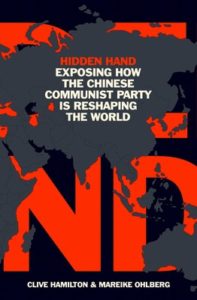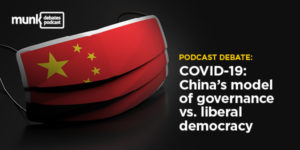I’m looking forward to taking part in this event on July 28, at @fiu_sipa: “China’s Sharp Power: Beijing’s Growing Repression in Hong Kong, Xinjiang and Around the World” https://t.co/NfxD2y9KZ5 pic.twitter.com/B2eEHsAcgY
— Christopher Walker (@Walker_CT) July 25, 2020
Western hopes that China would converge with the liberal international order have failed, argues Brookings analyst Thomas Wright. The United States should put the free world at the center of its foreign policy, he writes:
Kelly Magsamen of the Center for American Progress recently put it succinctly. “Rather than organizing U.S. foreign policy purely around competition with China,” she told me, “we should be organizing it around our democratic allies with the goal of strengthening and catalyzing the free world. That’s a far more affirmative theory of the case that would better reflect American values, play to our comparative advantages, and frankly get better collective results.”
 That strategy is the way to get allies and Americans on board with a competition between governance systems because it recognizes that the challenge comes from within and is something the U.S. should do even if there were no competition with China, Wright contends. RTWT
That strategy is the way to get allies and Americans on board with a competition between governance systems because it recognizes that the challenge comes from within and is something the U.S. should do even if there were no competition with China, Wright contends. RTWT
China is better positioned than ever to blunt U.S. relative power in the international system, argues analyst Ankit Panda.
Beijing’s increasingly assertive behavior along its periphery and rising global ambitions stand to leave a world more primed for the spread of authoritarian ideals than ever before, he writes for The Diplomat. The engagement bargain—the idea that a broader, neoliberal process of assuring ever-increasing economic interdependency between the United States and China would transform the latter—has largely failed.
But the US and its democratic allies Australia, Japan and India comprise a on-off “Quadrilateral” defense arrangement, a concept that envisions establishing an “Asian Arc of Democracy” around authoritarian China, adds analyst Richard Javad Heydarian. Japanese Prime Minister Shinzo Abe, who has called for a “democratic security diamond” in the Indo-Pacific, is one of key architects of the new alliance of like-minded powers, he writes for Asia Times.
 Is China changing the world? Massimo Introvigne asks in Bitter Winter. Emphatically yes, according to Hidden Hand: Exposing How the Chinese Communist Party Is Reshaping the World, by Australian academic Clive Hamilton, of Charles Sturt University, and German researcher Mareike Ohlberg, currently at The German Marshall Fund of the United States:
Is China changing the world? Massimo Introvigne asks in Bitter Winter. Emphatically yes, according to Hidden Hand: Exposing How the Chinese Communist Party Is Reshaping the World, by Australian academic Clive Hamilton, of Charles Sturt University, and German researcher Mareike Ohlberg, currently at The German Marshall Fund of the United States:
Like Chairman Mao, Xi divides the population of the world in three segments: the “red” friends, the “black” enemies who should be destroyed by using all possible legal and illegal means, and the “gray” in the middle, those who can be bought or persuaded to work with the “reds.” The book is a long catalogue of how there are in the West a few “reds” ideologically committed to Xi’s “Socialism with Chinese characteristics,” and many “grays” who are bought, blackmailed, or otherwise “persuaded.” They are in all countries, and come from all political persuasions.

National Endowment for Democracy (NED)
The National Endowment for Democracy’s Christopher Walker addresses the challenge of China’s Sharp Power event on July 28 at @fiu_sipa (see above).
In the span of a few short decades, China has established itself as a global actor, with its influence spanning the world from South Asia to the Middle East, Latin America, and the Pacific, Brookings adds. On July 29, Foreign Policy at Brookings will host Deputy Assistant to the President and Senior Director for South and Central Asia Lisa Curtis to explore the impact of China’s global activism and the world’s response. At the White House, Lisa Curtis serves at the forefront of shaping U.S. policy toward South and Central Asia, a region where China has invested considerable focus on expanding its influence.
The event will launch the next tranche of Brookings papers, “Global China: Regional Influence and Strategy,” released as part of its series “Global China: Assessing China’s Growing Role in the World.”







